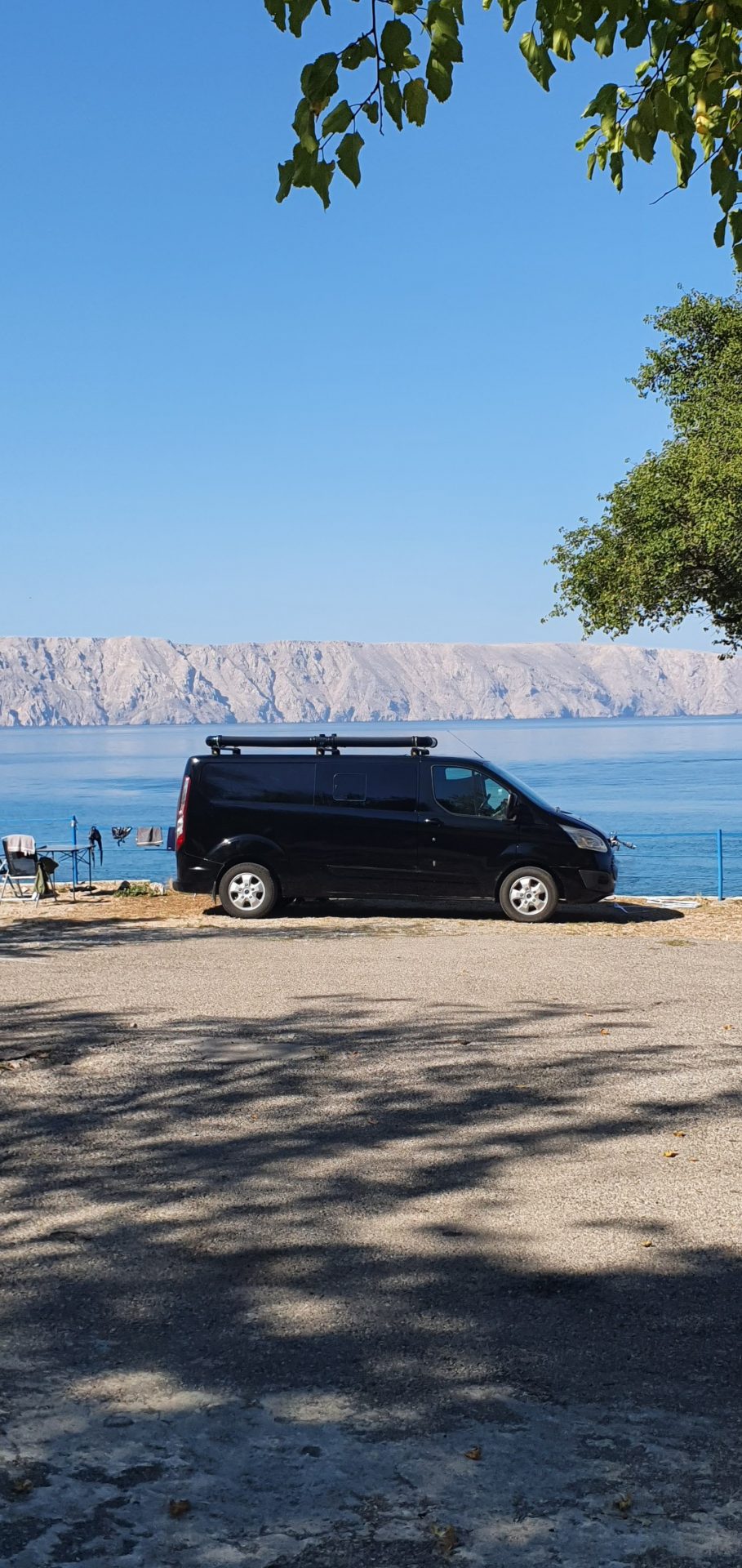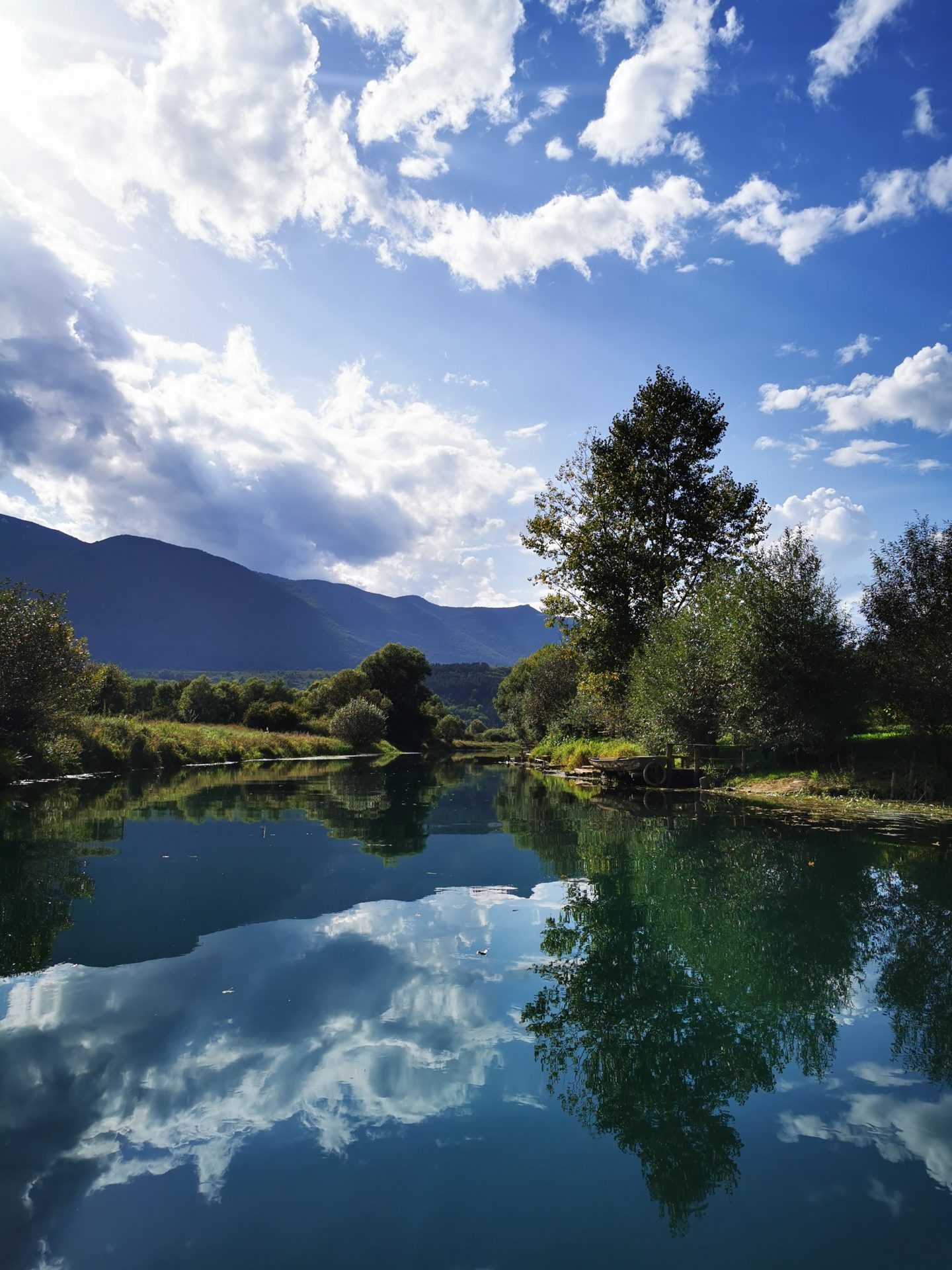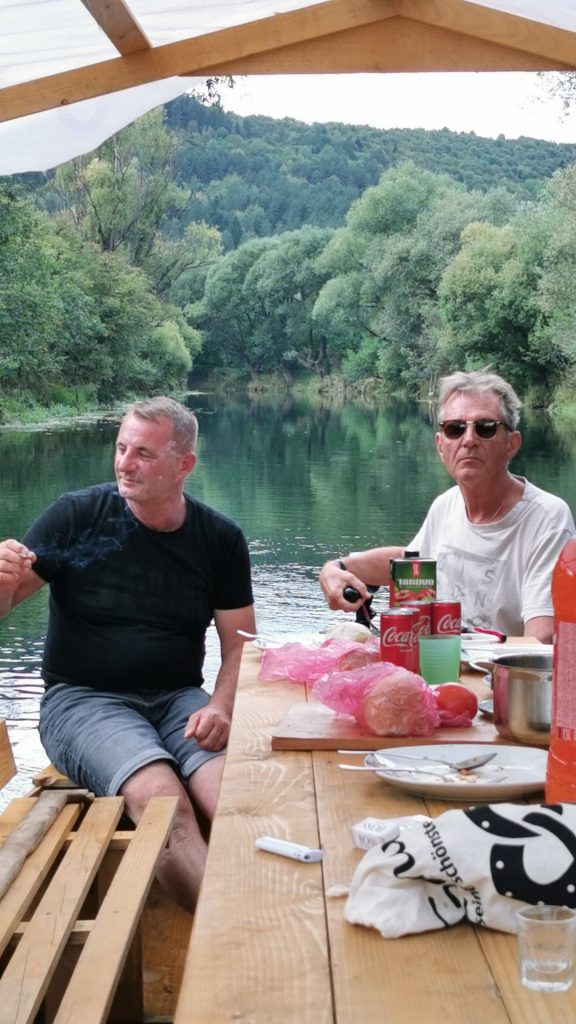We’re driving south again, back into Croatia, where we are transiting a short stretch of the Croatian Adriatic coast. The Adriatic looks beautiful and there are plenty of small campsites on the shoreline. I’d like to stay here for a night. I see a sign pointing to the sea that declares ‘campsite’. I pull off the coast road into a small empty terraced parking lot. It’s not busy, a couple of motorhomes. There’s blue security tape, partially removed, sectioning off the shower block and toilets, the water taps, the electricity supplies, and some of the parking areas. The beach bar is boarded up. A sign at the entrance states that ‘the owner has Covid, leave money in the box. 20 euros by the beach.15 euros further back’. It’s squalid but the small narrow stretch of beach looks great as does the sea. I don’t mind a bit of squalor. To Jo’s dismay I say ‘This place looks ok. And it’s unmanned. I reckon it’s free’. ‘You reckon? Better be,’ says Jo, ‘coz we haven’t got any Euros, or Croatian Kuna’.
We swim, sunbathe and enjoy the view out to sea towards the forested hillside of Krk island, almost imagining that we weren’t at a derelict campsite at all. We make full use of the condemned facilities.
I’m preparing dinner in the van when we’re approached by a dark, burly unshaven Croat (Think Zorba the Greek.) ‘20 Euros’ he says without greeting or a smile. I negotiate it down to 15 and say ‘Please five minutes. I get you money’. To Jo I say, ‘Great. Now what? Zorba’s gonna break my fingers’. Jo says, ‘I’m sure I’ve got some Euros somewhere’. How can this be? I think to myself. I’d never have any quantity of cash hoarded away somewhere. Same with booze. But Jo thinks that she might have an old envelope somewhere that’s labelled ’Foreign Currency 2002’. This, she thinks, might be stashed inside a bag labelled ‘odds and sods’ in the bottom of one of three 20 litre plastic storage boxes somewhere in the back of the van – maybe. I’m sceptical. Whilst Zorba shuffles off in search of other prey we unpack the van. After only five minutes – Jo knew she had money stashed – she triumphantly waves several Euro notes in the air. She was right about the inevitability of paying and she saved the day. I’m delighted, but it’s a small setback on my road to redemption from uselessness.



Early next morning, after a swim in the sunshine we drive along the busy coastal road to the town of Senj and then east over the hills into the Croatian hinterland. For the next few hours, due to road closures, Google maps will send us on a merry chase down remote country lanes, and depending on where you stand, this is either a frustrating waste of precious time or an opportunity to leisurely enjoy some of the countryside. Google knows about the first closure and directs us down a circuitous potholed lane for half an hour. We’re in flat fertile farming country where there are lots of abandoned homes, some pockmarked by gun and shell fire, others completely destroyed.
I can remember, as a child, England and more particularly Belgium, in the mid to late 1960s – twenty to twenty five years after the second world war. There was none of the destruction that I see about me here, twenty five years after the Balkan wars. There has been some reconstruction, and some new buildings, but a lot remains in ruins where, I imagine, inhabitants have not returned. This was a recurring theme in Derla Murphy’s Balkan Odyssey; the forced removals, the horror of murder and rape, so that even if people are not ‘ethnically cleansed’, they’re simply too afraid or so traumatised that they never returned. Or the homes, villages of one group are now occupied by another. Admittedly, Dervla wrote about these displacements only a few years after the war, but over twenty years later I sense no rapprochement.
She also takes issue with the phrase ‘ethnic cleansing’ and is minded to start a campaign against its use. Whilst based on a term that originated in Serbia; ‘cleansing the terrain’, foreign journalists adapted the phrase for their own use, and this doubly inaccurate term is now used all over the English speaking world. As Dervla wrote, “The abuse of language blunts both thinking and feeling. ‘Cleansing’ is a wholesome word, conjuring up a process with a healthy outcome. And in the Balkan case ‘ethnic’ cleansing is seriously misleading. Apart from Kosovo’s Albanians, all those involved in the recent conflicts are of the same stock – southern Slavs to a man and woman. They were not murdering, plundering and displacing each other for ethnic reasons.”
Being Irish, Dervla would know a thing or two about ethnic conflict where, in Ireland, those of Celtic origin were pitted against Anglo Saxons. Regarding the Balkan wars I’m reminded of the American Civil War where Confederate Scots, Irish and English troops fought their northern Scots, Irish and English adversaries.

We see several generations of a dark skinned family, the children in tatters, harvesting plums from one of the many small orchards in the region.
Back on the decent two lane highway (the major A road between Croatia and Bosnia) we see that the fast lane is closed up ahead. There’s a big guy in grey overalls, with a bucket in hand, standing impassively in the middle of the slow lane. ‘Closed. Go back.’ he says. We can now see that the road up ahead is being resurfaced and is impassable. Google knows nothing about this closure and there is no signposted diversion. ‘We want to go to Bosnia. No go back.’ I say. But I think he’s exhausted his English vocabulary. ‘Closed. Go back.’ he repeats. So we reluctantly turn around. Jo manages to locate a minor road, suggested by Google, fourteen kilometres long, through the nearby National Park into Bosnia. This is a great road if you’re going hunting in a Land Rover. We’re behind an old truck with a canvas canopy, belching acrid black diesel fumes. He’s rattling confidently along this massively potholed dirt track that climbs, dips and twists through what, under normal circumstances I’d appreciate as a beautiful ancient forest. After about 8 km there’s a ‘vehicles prohibited’ sign which the old truck ignores. And we’re not for turning either – not that we could if we wanted to. An hour later we emerge, with some relief, onto a tarmac road that quickly leads us to the Bosnian border near Bihac.

It’s a warm sunny evening in Bosnia. Our Park4night App indicates that there’s a riverside campsite with excellent reviews, just beyond Bihac, on the banks of the river Klokot, a tributary of the river Una. Reviewers say that the campsite owner, Hussein, is a friendly and helpful guy. As always, we’re on the lookout for free camping and there is the possibility of such on the banks of the Klokot before Husseins. We’re at this possible freebie location when a big Bosnian, cigarette dangling from mouth, smiles and waves at me from a dirty old red Nissan car. Somehow I know who this is. ‘Hi.’ I say, ‘You must be Hussein.’ ‘Follow.’ He says.
We follow him a short distance along a rough track, across an old wooden beam bridge, to a large grassy field. Hussein is a big round faced guy, devoid of any muslim features that his name might suggest. He offers a firm handshake. His first word to us is, ‘Relax.’ I ask him something in English and he says ‘Relax. No stress.’ I ask him something in German and, motioning his hands, palms down in front of him, he says ‘Relax. No stress friend.’ And whilst we will get to know each other quite well over the next 24 hours, these and a few other exclamations will be our only dialogue.


Under willow trees, next to the slow flowing river Klokot, in the dappled late afternoon sunlight, stands Hussein’s splendid little wooden chalet with a covered terrace overlooking the river. And moored on the river is a boat upon which sits a table for six people, under a white canvas awning. Monet would be inspired by the tranquil scene.
Hussein offers us a seat at the table on his porch and insists we share his lunch; omelette with sausage, salami, grilled vegetables and bread. ‘Relax. No stress’. I ask him if he has any wifi and he asks me, ‘slivovitz?’ ‘Slivo. Sure.’ I reply. Slivo is, mostly homemade, plum brandy. Collectively known as rakia, the Balkans produces a host of such distillations; komovica (grape rakia), travarica (herb rakia), orahovac, made from walnuts, and one of the most highly regarded, dunjevaca, made from quince, in Serbia. I’ll get to sample plenty of these in some quantity – to accompany breakfast, lunch, dinner, or on its own. Over the next few weeks I’ll get the impression that Bosnia and Serbia are on a bit of a bender.
Hussein wanders to the back of the field where, next to a woodpile, he parked his old car. He fires up a small diesel generator which powers, amongst other necessities, a wifi router. I see him walking back with a green litre wine bottle in his arms. A car approaches to cross the field and Hussein hides the bottle behind his back. Once it has passed he relaxes and, using his one small rakia glass, he pours me a shot of clear slivovitz. ‘Minimal’, says Hussein as he pours – the ‘al’ rhyming with ‘pal’. He’s suggesting that the shot is just a little one (it isn’t). I down it in one. It’s sharp, chest warming, with a taste of plums but without that jammy fruit flavour. I like it very much. He pours a ‘minimal’ for Jo and then one for himself. ‘Hop’ he says – the Bosnian ‘cheers’. We’re sharing the same shot glass – so much for post pandemic caution. I imagine the slivo is as effective as any alcoholic hand wash. We share another. ‘Relax. Minimal. Hop’. Then another.
An attractive young German couple,Thomas and Sylvie, arrive in their stylish brand new Mercedes campervan. Thomas works for Mercedes in Stuttgart and Sylvie is a social media influencer. They speak fluent English and, well oiled by the slivo – ‘relax, minimal, hop, minimal, hop’ – we get along like a house on firewater. Hussein retrieves another bottle from the woodpile.
It’s a fine warm evening and we’re all pleasantly plastered and ‘relaxed’. Hussein has become affectionately tactile – not with the beautiful women, or even the handsome Thomas – but with me. He kisses my cheeks and the side of my head, and more intimately, my neck. He hugs me and grips my upper leg. I’ve spent most of my life in the south of England where such male on male intimacies are the provenance of our gay brothers. I’ve never felt my masculinity threatened by male advances but Jo, Thomas and Sylvie think it’s hilarious, giggling at every grope, and that makes me feel a little awkward. I’m certainly too drunk to speculate on the reasons for his amour – perhaps he is gay or it’s a Bosnian thing when hammered.
As the night progresses the party moves to our bar – the kitchen at the back of the van. I open a bottle of Slovenian red wine and Thomas opens a bottle of Swabian white. There’s more salami, cheese and bread, and the ‘minimal hops’ just keep on coming. The conversation is animated and Hussein loves me. After a couple of hours I suddenly reach a point where I can’t take any more of anything so, without completely physically abandoning the fest, I just crash out on the bed.
I’m awake early next morning with a surprisingly clear head. The campsite is tranquil but the sunshine is awfully bright. There’s smiles all round and we laugh about our unexpected evening social. I see a couple of other campervans I’d not noticed last night. Oh dear, what dreadful neighbours we must have been. I wander to a discrete corner of the field for a wee where, in mid-flow, Hussein creeps up behind, embraces me and kisses my neck. But, this morning his affections are for Thomas too. He hugs him and firmly grips a buttock, ‘Friend’, he says.
Hussein is making coffee in the kitchen. We’re sitting on the porch and Jo tells me that she’s had a Google translate chat with Hussein where he messaged her that I remind him of his deceased father and this is the root of his affections for me. Over the coffee, Hussein, with tears welling in his eyes, messages me,‘You are very like my late father’. I respond, ‘it is good to meet somebody who reminds you of someone you once loved’. He shows me an image on his phone of his father in a military uniform at what looks like an airfield. Hussein would have been in his late teens, early twenties during the Balkan war. It is possible that his father was killed in the conflict. Hussein doesn’t say and I don’t probe. But I’m reminded of the proximity of the war and the people, many younger than me, whose lives have been adversely affected or wrecked by it.
My tooth is playing up – the antibiotics not having the desired effect. I say to Jo that we should be thinking about heading off. Hussein senses that we are planning to leave. ‘Relax’ he says, ‘No gas gas. No stress’. Jo says to him. `We need to go Hussein’. ‘Blah, blah, blah.’ he says, ‘No gas, gas.’ indicating that we must not drive away. He texts me. ‘I will cook you lunch. It will be wonderful. We will go on the boat on the river’. It’s very difficult to refuse. There are hugs and kisses all round when Thomas and Sylvie leave to drive on towards Montenegro. We stay for lunch.
I relax on a big rug under the willow tree by the river whilst Jo and Hussein gather tomatoes, peppers, onions, potatoes and melon from the vegetable garden.

Hussein’s river cruiser is a simple flat bottomed wooden boat with a table, bench seating, a canvas canopy and a quiet electric engine powered by a 12v leisure battery. In the early afternoon we quietly set off downriver. The water is crystal clear, very cold with plenty of vegetation and trout. Lunch is roasted peppers, tomatoes, onions and fried eggs. There are cold beers and the remains of the slivo which we ‘minimal’ and ‘hop’ with gusto. When Jo refuses any more alcohol Hussein says, ‘Blah, blah’. I notice that he drinks enthusiastically but eats nothing. At a bend in the river we see a large mammal at the water’s edge – more closely we see it’s a big beaver munching on a plant. We watch him for some moments before Hussein claps his hands and it dives underwater. I have my binoculars with me and when I focus on a low flying helicopter Hussein says, ‘Putin’. Another favourite catchphrase is, ‘No politica’, or when we fail to comprehend each other, “Communicatzie problem”.
We cruise as far as a weir and on our return up river Hussein moors up and disappears across a field to a large house, possibly his home. He’s alluded to a daughter but says nothing of a wife. He returns some minutes later with another two litres of slivovitz – which confirms my suspicions that Hussein is not just a party animal – he’s an alcoholic.
I tell Jo that we must go – the hospitality is great but the drinking is pretty relentless and our brains and stomachs can’t cope with much more. We have to drag ourselves away. There are tears – much hugging and kissing. Jo says to me as we drive away, ‘I guess if you’re a drinker, you’re always needy of company. It’s always better to drink with friends than on your own.’ I agree with Jo, but only up to a point, because in the end the unrelenting alcoholic’s only enduring friend is the bottle. Later, Hussein messages us saying that he loves us and we will always be his friends.
For the net stage of our Balkan journey please visit Travnik and Slivo with Nino.




